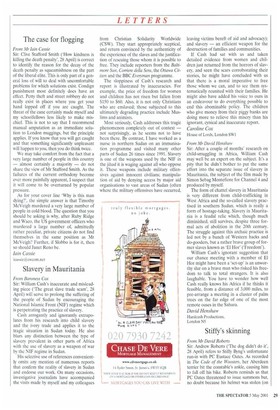Slavery in Mauritania
From Baroness Cox Sir: William Cash's inaccurate and misleading piece ('The great slave trade scam', 28 April) will serve to prolong the suffering of the people of Sudan by encouraging the National Islamic Front (NIF) regime which is perpetrating the practice of slavery.
Cash arrogantly and ignorantly extrapolates from his research into child slavery and the ivory trade and applies it to the tragic situation in Sudan today. He also blurs any distinction between the type of slavery prevalent in other parts of Africa with the use of slavery as a weapon of war by the NIF regime in Sudan.
His selective use of references conveniently omits any mention of numerous reports that confirm the reality of slavery in Sudan and endorse our work. On many occasions, investigative journalists have accompanied the visits made by myself and my colleagues
from Christian Solidarity Worldwide (CSW). They start appropriately sceptical, and return convinced by the authenticity of the experience of the slaves and the justification of rescuing those whom it is possible to free. They include reporters from the Baltimore Sun. Corriere della Sera, the Ottawa Citizen and the BBC Everyman programme.
The sloppiness of Cash's research and report is illustrated by inaccuracies. For example, the price of freedom for women and children has not risen but fallen from 5150 to $60. Also, it is not only Christians who are enslaved; those subjected to this ultimately degrading practice include Muslims and animists.
Most seriously, Cash addresses this tragic phenomenon completely out of context — not surprisingly, as he seems not to have been there. By contrast, I have worked as a nurse in northern Sudan on an immunisation programme and visited many other parts of Sudan 26 times since 1991. Slavery is one of the weapons used by the NIF in the jihad it is waging against all who oppose it. These weapons include military offensives against innocent civilians; manipulation of aid by denying access by major aid organisations to vast areas of Sudan (often where the military offensives have occurred, leaving victims bereft of aid and advocacy); and slavery — an efficient weapon for the destruction of families and communities.
If Cash had sat with us and taken detailed evidence from women and children just returned from the horrors of slavery, and seen the scars corroborating their stories, he might have concluded with us that there is a moral imperative to free those whom we can, and to see them systematically reunited with their families. He might also have added his voice to ours in an endeavour to do everything possible to end this abominable policy. The children who give money from their piggy banks are doing more to relieve this misery than his ignorant, cynical and inaccurate report.
Caroline Cox
House of Lords, London SW1
From Mr David HenshaW Sir: After a couple of months' research on child-smuggling in Africa, William Cash may well be an expert on the subject. It's a pity that he didn't bother to put the same effort into the separate issue of slavery in Mauritania, the subject of the film made by Simon Sebag Montefiore for Channel 4 and produced by myself.
The form of chattel slavery in Mauritania is very different from child-trafficking in West Africa and the so-called slavery practised in southern Sudan, which is really a form of hostage-taking. Slavery in Mauritania is a feudal relic which, though much diminished, still survives, despite three formal acts of abolition in the 20th century. The struggle against this archaic practice is led not by a bunch of Western hacks and do-gooders, but a rather brave group of former slaves known as 'El Hor' (`Freedom).
William Cash's ignorant suggestion that our chance meeting with a member of El Hor might have been a 'set-up' is an unworthy slur on a, brave man who risked his freedom to talk to total strangers. It is also laughable. You have to wonder how well Cash really knows his Africa if he thinks it feasible, from a distance of 3,000 miles, to pre-arrange a meeting in a cluster of palm trees on the far edge of one of the most remote oases in the Sahara.
David Henshaw
Hardcash Productions, London N5










































































 Previous page
Previous page